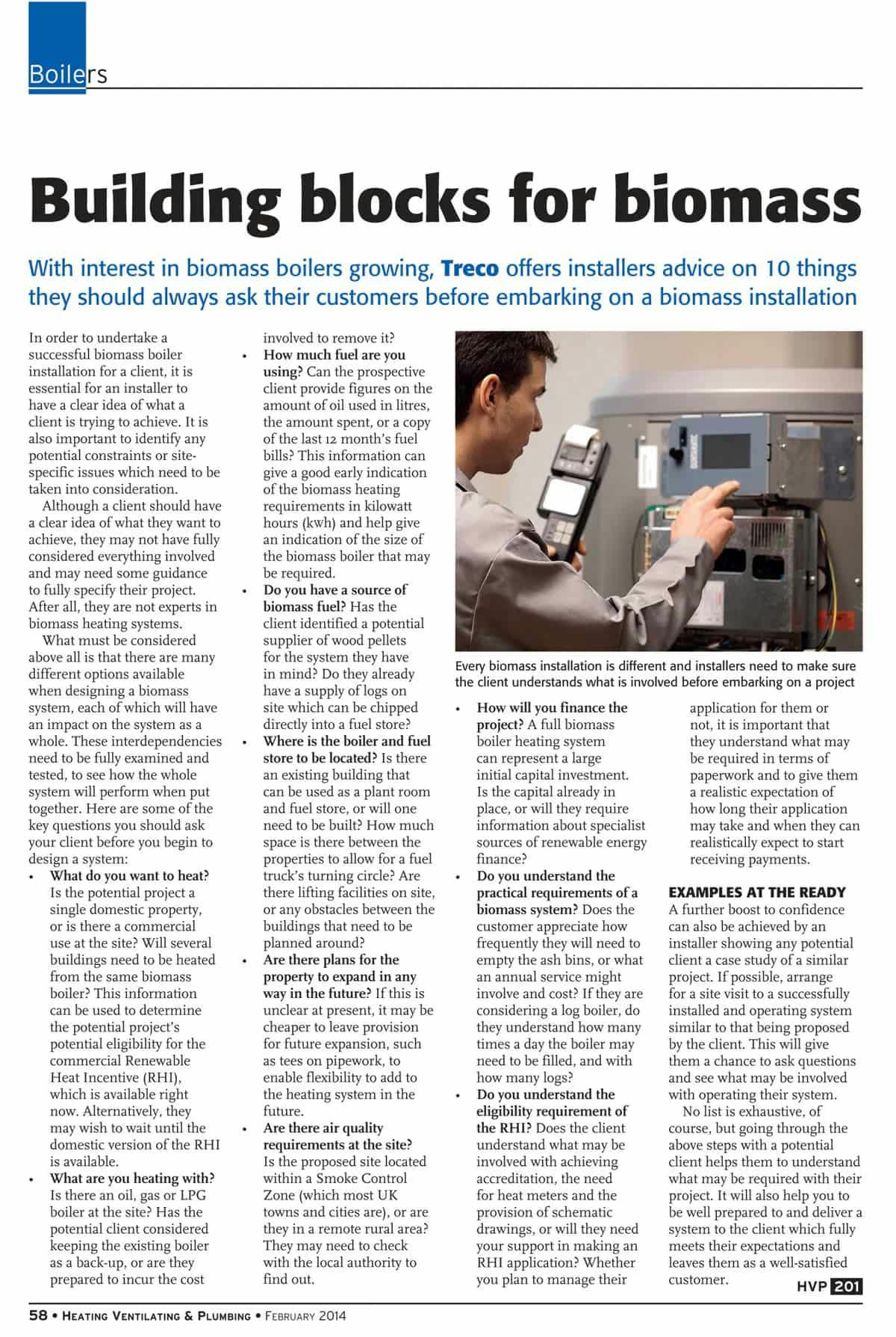Treco has been featured in HVP Magazine and the article focuses on important questions that an installer should ask a prospective biomass boiler client, in order to gain some of the most important information.

The text in full is as follows:
Top 10 things an installer should ask their biomass-heat prospect
In proposing and then undertaking a successful biomass boiler installation for a client, it is essential for an installer to have a clear idea of what a client is trying to achieve. It is also important to identify any potential constraints or site-specific characteristics which need to be taken into consideration.
Equally, although a client should have a clear idea of what they want and can achieve they may not have fully considered all that may be involved and need some guidance to fully specify their project. After all, they are not the biomass boiler heating system expert. We’ve summarised some key questions that might need to be asked below to cover the some of the key system design issues and considerations.
It isn’t a sequential list, what must be considered above all is that biomass system design is an iterative process: there are many options and inter-dependencies. These inter-dependencies need to be fully examined and tested, to see how the whole system will perform when put together to inform any design decisions.
1. What do you want to heat?
Is the potential project a single domestic property or is there a commercial use at the site? Will several buildings need to be heated from the same biomass boiler? This information can be used to determine the potential project’s potential eligibility for the commercial Renewable Heat Incentive (RHI), which is available right now. Alternatively, should they wait until May 2014 when the domestic version of the scheme is due to launch?
2. What are you heating with?
Is there an oil, gas or LPG boiler at the site? Has the potential client considered keeping the existing boiler as a back-up or are they prepared to incur the cost to remove it?
3. How much fuel are you using?
Can the prospective client provide figures on the amount of oil used in litres, the amount spent or a copy of the last 12 month’s fuel bills? This can give a good early indication of the biomass heating requirements in kilowatt hours (kWh) and help give an indication of the size of the biomass boiler that may be required.
4. Do you have a source of biomass fuel?
Has the client identified a potential supplier of wood pellets for the system they have in mind? Do they already have a supply of logs on site which can be chipped directly into a fuel store?
5. Where could the boiler and fuel store to be located?
Is there an existing building that can be used as a plant room and fuel store or would one need to be built? How much space is there between the properties for a fuel truck’s turning circle? Are there lifting facilities on site or any obstacles between the buildings that need to be planned around?
6. What are your future aspirations?
Does the client plan to add new strands to their business or to extend their house to include a granny flat? If this is unclear at present, it may be cheaper to leave provision for future expansion such as tees on pipework to enable flexibility to add to the heating system in the future.
7. Are there air quality requirements at your site?
Is the proposed site located within a Smoke Control Zone (which most UK towns and cities are) or are they in a remote rural area? Have they spoken to their local authority to find out?
8. How will you finance the project?
A full biomass boiler heating system can represent a large initial capital investment. Is the capital already in place or will they require information about specialist sources of renewable energy finance?
9. Do you understand how the system will work?
Does the customer understand how frequently they will need to empty the ash bins or what an annual service might involve and cost? If they are considering a log boiler, do they understand how many times a day the boiler may need to be filled and with how many logs?
10. Do you understand the eligibility requirement of the RHI?
Does the client understand what may be involved with achieving accreditation, the need for heat meters and the provision of schematic drawings or will they need your support in making an RHI application? Whether you plan to manage their application for them or not, it will be important to ensure that they understand what may be required in terms of paper work and to give them a realistic expectation regarding how long their application may take and when they can realistically expect to start receiving payments.
A further boost to confidence can also be achieved by an installer showing a potential client a case study of a similar project. If possible, arrange for a site visit to a successfully installed and operating system similar to that being proposed by the client. This will give them a chance to ask questions that they may not otherwise and to see what may be involved with operating their system.